Parallel Passages Collection (23 vols.)
Digital Logos Edition
Get top-level analysis and multiple viewpoints on Bible passages that provide narrative or thematic parallels. Logos’s Parallel Passages feature draws from each one of these 23 resources to provide detailed accounts where biblical events are recorded more than once—especially in the historical books of the Old Testament (Kings, Chronicles, and Samuel) and the Gospels. Featuring classical and historical harmonies as well as those developed here at Faithlife, this collection gives you everything you need to see different experts’ research on the Bible’s parallels.
From Kurt Aland’s Synopsis to A.T. Robertson’s classic Harmony of the Gospels to Eusebius’ ancient and very early harmonized canons of the Gospels, this collection gathers everything you need to see where the Bible story overlaps and when each passage is supported by another passage on the same narrative. Together with commentary and textual notes, these volumes broaden your study of the biblical text.
Curious how these resources work in Logos? Watch the video below to see for yourself where you’ll be using them.
Please note: This product does not contain Logos software—only books to enhance the experience of your study. There are numerous ways to upgrade to Logos—click here to find out which is best for you.
- Coverage of narrative overlap in Samuel, Kings, and Chronicles, as well as the four Gospels
- Parallels between the deuterocanonical history and Josephus as well as thematic parallels in the New Testament epistles
- Analysis of Old Testament passages which appear in the New Testament
- Title: Parallel Passages Collection
- Volumes: 23
- Resource Types: Harmonies
- Topic: Historical Books, Gospels, Pastoral Epistles
- Software Requirements: Logos
This title is included in the following collections
You can save when you purchase this product as part of a collection.
Parallel Passages Collection (...
$310.29$185.99
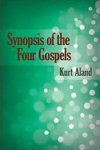
Synopsis of the Four Gospels
- Author: Kurt Aland
- Publisher: Deutsche Bibelgesellschaft
- Publication Date: 2001
Kurt Aland’s Synopsis of the Four Gospels is a standard reference tool for Greek scholars, seminarians, translators, and students of the Greek text of the Gospels. The Logos edition of the Synopsis can be used with the Greek text or any bible version in your library.
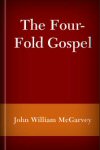
The Four-Fold Gospel
- Author: John William McGarvey
- Publisher: The Standard Publishing Company
- Publication Date: 1914
From the introduction: "It is unique, presenting a combination of features never before collected in one work. Harmonies and Four-fold Gospels are plentiful, and we have examined a large number of them, beginning with the pioneer work of Tatian. We have sought to utilize all the good features employed by others, and to introduce several new and helpful inventions of our own."
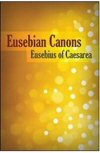
Eusebian Canons
- Author: Eusebius of Caesarea
The Eusebian Canons is one of the first Gospel harmonies and the most widely used. It divides the Gospels into sections to show where they agree with one another. This harmony was in wide use from the fifth century onward, and still serves an important purpose for understanding how the Gospels tell an important story, and how that story has been understood and interpreted throughout the church’s history.
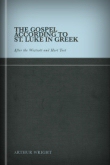
After a thorough introduction, Wright provides the text of Luke's Gospel in Greek parallel with examples and illustrations from the other Gospels.
A valuable contribution to the study of the Gospels. . . . A book which deserves and will well repay the attention of all students of the Gospels. . . . We can strongly recommend the book for its thoroughness, its sound scholarship, its great accuracy.
—Athenaeum
Arthur Wright (1870–1889) was Classical Lecturer and Vice President of Queens' College, Cambridge.
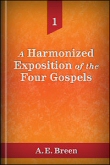
In A Harmonized Exposition of the Four Gospels the Greek texts of the four gospels are arranged in the form of a harmony. A literal English translation accompanies the Greek text and is arranged in the same way. By this arrangement, the life of Christ becomes one connected narrative, and the statements of each Evangelist become fuller and clearer, being supplemented by the parallel passages of the others. Along with this harmony, A. E. Breen provides a critical commentary, with special attention given to adapt the book for pulpit use—hence the moral application of the events, words, and deeds is made a main feature of this unique commentary.
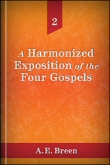
In A Harmonized Exposition of the Four Gospels the Greek texts of the four gospels are arranged in the form of a harmony. A literal English translation accompanies the Greek text and is arranged in the same way. By this arrangement, the life of Christ becomes one connected narrative, and the statements of each Evangelist become fuller and clearer, being supplemented by the parallel passages of the others. Along with this harmony, A. E. Breen provides a critical commentary, with special attention given to adapt the book for pulpit use—hence the moral application of the events, words, and deeds is made a main feature of this unique commentary.
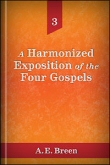
In A Harmonized Exposition of the Four Gospels the Greek texts of the four gospels are arranged in the form of a harmony. A literal English translation accompanies the Greek text and is arranged in the same way. By this arrangement, the life of Christ becomes one connected narrative, and the statements of each Evangelist become fuller and clearer, being supplemented by the parallel passages of the others. Along with this harmony, A. E. Breen provides a critical commentary, with special attention given to adapt the book for pulpit use—hence the moral application of the events, words, and deeds is made a main feature of this unique commentary.
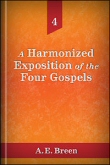
In A Harmonized Exposition of the Four Gospels the Greek texts of the four gospels are arranged in the form of a harmony. A literal English translation accompanies the Greek text and is arranged in the same way. By this arrangement, the life of Christ becomes one connected narrative, and the statements of each Evangelist become fuller and clearer, being supplemented by the parallel passages of the others. Along with this harmony, A. E. Breen provides a critical commentary, with special attention given to adapt the book for pulpit use—hence the moral application of the events, words, and deeds is made a main feature of this unique commentary.

Gospel harmonies were inevitable. One of the first impulses of someone studying a teaching or an event in Jesus’ life is to seek as many perspectives on that event as possible. Around A.D. 160 Tatian compiled a single narrative of the four Gospels, reducing the number of verses from 3,780 (four separate Gospels) to 2,769 verses without excluding any event or teaching from the life of Jesus.
This Harmony of the Gospels builds on a tradition of harmonization begun in the nineteenth century by John A. Broadus and continued by his protégé, A. T. Robertson.
The Harmony of the Gospels contains interpretive and clarifying notes by a number of scholars, some with differing views on the relationship between various Gospel accounts. Beyond the harmony, this volume includes articles designed to address issues that arise when one compares the four Gospels and seeks to give an integrated account of the life and teachings of Jesus. This harmony also contains eight four-color maps that illuminate the life and ministry of Jesus. This resource will be valuable to pastors and lay Bible teachers, and will serve well as a primary textbook in college and seminary courses on the Gospels and on the life and teachings of Jesus.
Steven L. Cox is Associate Professor of New Testament and Greek at Mid-America Baptist Theological Seminary. He was educated at Anderson College, Central Wesleyan College, and Erskine Theological Seminary, and he received his Ph.D. from The Southern Baptist Theological Seminary. Dr. Cox is author of A History and Critique of Scholarship Concerning the Markan Endings and Essentials of New Testament Greek: A Student’s Guide. He has extensive pastoral experience and is currently pastor of Big Creek Baptist Church, Millington, Tennessee.
Kendell H. Easley is Professor of Christian Studies and Program Director for the Master of Christian Studies, Union University. Dr. Easley has authored numerous books including 52 Words Every Christian Should Know, Quick Source Guide to Understanding the Bible, Holman Illustrated Guide to Biblical History, and the volume on Revelation in the Holman New Testament Commentary. He holds degrees from John Brown University, Trinity Evangelical Divinity School, and Southwestern Baptist Theological Seminary.
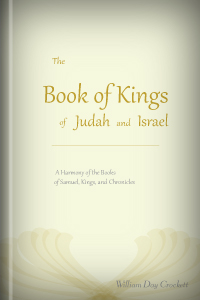
Chronologically moving through the Books of Samuel, Kings, and Chronicles, William Day Crockett provides thorough exegesis that is systematically divided between the reigns of Saul, David, and Solomon. Discoursing on Israel's want for a monarchy, Crockett inculcates the reoccurring sin and redemption cycles that Israel initiates—regardless of admonition and warning.
His work is in line with the revival of interest in the Bible as literature. There is an analytical outline, and a full appendix and index. Mr. Crockett has shown skill and judgment that will commend his work to the great mass of students.
—Public Opinion
Mr. Crockett's work is an honest, laborious and successful piece of this study of the Old Testament as it is, that is to be so highly commended both a piece of work and as an aid to others in the study of the central section of the history of the Old Testament as it lies in the documents. It ought to have a ’wide acceptance and usefulness.‘
—The Presbyterian and Reformed Review
William Day Crockett (1869–1930) was Pastor of the First Presbyterian Church in Canton, Pennsylvania. Crockett is the author of several titles including A Harmony of the books of Samuel, Kings, and Chronicles and A Satchel Guide to Europe
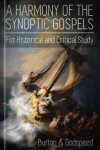
A Harmony of the Synoptic Gospels
- Authors: Ernest DeWitt Burton and Edgar Johnson Goodspeed
- Publisher: Charles Scribner’s Sons
- Publication Date: 1917
- Pages: 294
A Harmony of the Synoptic Gospels, by Ernest DeWitt Burton and Edgar Johnson Goodspeed helps students of the Bible ascertain the relationship between the three Synoptic Gospels. The purpose of the Burton and Goodspeed Harmony is not mere harmonization of a historical order of events. Rather, it exhibits the facts of parallelism as they stand in the Gospels, both facilitating and promoting the historical study of the Gospels. The harmony contributes to a better understanding of the relationship of the Gospels to one another, and to a fuller knowledge of the life and teachings of Jesus.
Ernest De Witt Burton (1856–1925) graduated from Denison University in 1876, then from Rochester Theological Seminary in 1882. His studies also carried him to Germany at Leipzig and Berlin. Burton taught at the seminaries in Rochester and Newton before becoming head of the department of New Testament Literature and Interpretation at the University of Chicago—where he was president from 1923–1925.
Edgar Johnson Goodspeed (1871–1962) was educated at Denison University and the University of Chicago. Goodspeed went on to become professor of biblical literature and patristics at the University of Chicago in 1894. Goodspeed’s works include The Twelve: The Story of Christ’s Apostles, Problems of New Testament Translation, and The Apostolic Fathers: An American Translation.

A Harmony of the Gospels
- Author: A.T. Robertson
- Publisher: A.T. Robertson
- Publication Date: 1923
A.T. Robertson’s Harmony of the Gospels contains a parallel record of Jesus’ ministry, and serves as an essential book for serious study of the life of Jesus. It is based on a harmony first prepared three decades earlier by J.A. Broadus. Robertson’s Harmony, however, contains significant revisions and updates, incorporating the latest biblical and textual scholarship.
A. T. Robertson (1863–1934) was a renowned scholar and a terrific preacher. He was educated at Wake Forest University and Southern Baptist Theological Seminary. In 1892, Robertson was appointed professor at Southern Baptist Theological Seminary where he taught until 1934.
Robertson was a founding member of the Baptist World Congress, now known as the Baptist World Alliance. Throughout his incredible life, Archibald Thomas Robertson wrote 41 books ranging from grammars to simple character studies.
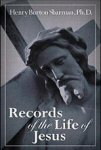
Records of the Life of Jesus
- Author: Henry Burton Sharman
Henry Burton Sharman’s Records of the Life of Jesus presents Jesus’ life in a form which enhances our understanding of the actual life and career of Jesus of Nazareth. This parallelism is constructed in chronological order where possible, thereby serving as an aid for historical study. Records of the Life of Jesus is divided into two sections: the first uses the Synoptic Gospels as the base text; the second uses the Gospel of John. This resource also contains numerous cross-references to the other Gospels.
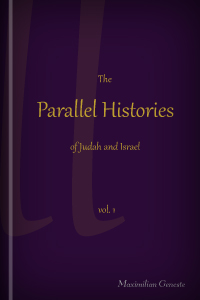
Examining the intimated relationship and history between Israel and Judah, Maximilian Geneste provides extensive commentary on the composition and arrangement of the text, historical context, and elucidation of reiterated motifs. Offering direct interpretation through semantics, Geneste seeks to convey the spiritual state of Israel and Judah during this period of time. Volume one covers the text from the reign of Rehoboam until the fall of Jerusalem.
Maximilian Geneste was the minister of the Church of the Holy Trinity, Isle of Wight. Geneste is the author of several titles including A Glance into the Kingdom of Grace and Christ in the Wilderness. Geneste died on July 27, 1860.
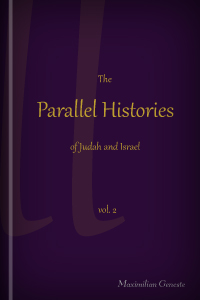
Examining the intimated relationship and history between Israel and Judah, Maximilian Geneste provides extensive commentary on the composition and arrangement of the text, historical context, and elucidation of reiterated motifs. Offering direct interpretation through semantics, Geneste seeks to convey the spiritual state of Israel and Judah during this period of time. Volume two covers the fall of Jerusalem until the Lamentations of Jeremiah.
Maximilian Geneste was the minister of the Church of the Holy Trinity, Isle of Wight. Geneste is the author of several titles including A Glance into the Kingdom of Grace and Christ in the Wilderness. Geneste died on July 27, 1860.
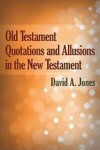
Old Testament Quotations and Allusions in the New Testament
- Author: David A. Jones
The New Testament depends heavily on the Old Testament. The significant metaphors, themes, and stories are used by all the writers of the New. The New Testament contains stories of prophecies and promises fulfilled in the life and work of Jesus Christ and in the work of the Early Church. Understanding the New Testament use of the Old Testament is critical for interpretation and exegesis. This resource, prepared by David A. Jones, documents all Old Testament allusions and quotations found in the New Testament.
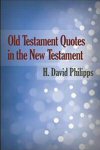
Old Testament Quotes in the New Testament
- Author: H. David Philipps
This resource contains all Old Testament quotations found in the New Testament. First prepared by H. David Philipps for the Holman Christian Standard Bible (HCSB), Old Testament Quotes in the New Testament is fully integrated into Logos Bible Software.
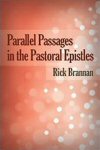
Parallel Passages in the Pastoral Epistles
- Author: Rick Brannan
- Publisher: Lexham Press
- Publication Date: 2003
The Pastoral Epistles were all written around the same time and cover many of the same topics. Rick Brannan’s Parallel Passages in the Pastoral Epistles aligns passages that use similar language, discuss similar concepts, or address similar groups.
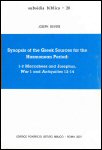
This volume offers a synopsis of 1 and 2 Maccabees in Greek. It includes not only all parallel sections of these two books but also Books 12–14 of Josephus’ Jewish Antiquities to the extent that they are paralleled in 1 Maccabees or in the Jewish War. Thus, the major sources for the history of Palestine from 175 to 37 BCE are made available here together for the first time in electronic form.
The synopsis aims primarily to serve as a basic tool for the literary and historical analysis and comparison of the texts included. It shows, in most cases unequivocally, how the texts, arranged here in parallel columns, deal in different fashion with the same or similar events. It also makes transparent where they follow the same or similar outline, share words and phrases—sometimes even entire sentences.
Synopsis of the Greek Sources for the Hasmonean Period assists the researcher in identifying and comparing different types of relations between various sections of these texts. Additions and omissions stand out immediately, but also passages rewritten in a more or less biased fashion are more easily identified than if one had to use each text separately. Furthermore, the synopsis may be useful as a tool for comparing the similarities and differences not only of content but also of style between the War and Antiquities, especially in passages where the parallels are particularly close.
This synopsis will be a valuable tool for scholars and students working with the books of Maccabees and/or with Josephus, and for those interested in various forms of intertextuality.
Joseph Sievers was born in Germany in 1948. He began his studies at the University of Vienna and at the Hebrew University. He holds a PhD in ancient history/Hebrew studies from Columbia University and a licentiate of theology from the Gregorian University. He has taught ancient History at the City University in New York, Jewish History at Seton Hall University, and New Testament Greek at the Pontificio Ateneo S. Anselmo. Since 1991, he has taught Jewish history and literature of the Hellenistic period at the Pontifical Biblical Institute. Among his publications are The Hasmoneans and Their Supporters: From Mattathias to the Death of John Hyrcanus I, and Josephus and the History of the Greco-Roman Period: Essays in Memory of Morton Smith which he coedited with Fausto Parente.
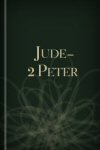
Jude–2 Peter Parallels
- Author: Jeffery Glen Jackson
Jude–2 Peter contains parallel passages between the Epistle of Jude and the Second Epistle of Peter, arranged by Jeffery Glen Jackson.
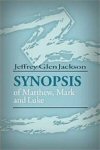
Synopsis of Matthew, Mark and Luke
- Author: Jeffery Glen Jackson
The Jackson Gospel synopsis enables readers of the Gospels to understand the parallels and chronology of the Synoptic Gospels. The order of Mark is followed first, and Luke second. Passages are frequently duplicated to provide context.

Synopsis of the Old Testament
- Author: Jeffery Glen Jackson
Synopsis of the Old Testament contains parallels within the Pentateuch, Chronicles–Samual–Kings, Prophets, and Psalms, arranged by Jeffery Glen Jackson.
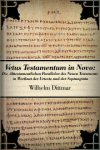
This volume is a German-language examination of parallels between the Old and New Testaments in the Septuagint.
Reviews
9 ratings

Billy Avery
7/17/2018

Michael John Nisbett
6/25/2018
Too many Catholic resources. The credibility of the collection is compromised by this fact.
hwang young sig
3/4/2017

Jeremy Korell
12/1/2016

Jonathan Spilger
3/11/2016

Unix
1/12/2016

Troy Corfield
12/6/2015

Chad Ethridge
8/26/2015

Denver Race
4/30/2015